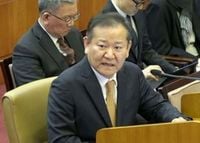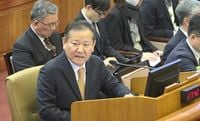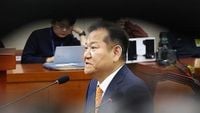Former Interior Minister Lee Sang-min returned home on Saturday, April 19, 2025, after an overnight police interrogation concerning his alleged involvement in former South Korean President Yoon Suk Yeol's brief imposition of martial law late last year. The former minister appeared before a special police investigation team at around 2 p.m. on Friday, April 18, 2025, and was released about 18 hours later at approximately 7:40 a.m. on Saturday.
Lee is suspected of directing the National Fire Agency to cut off power and water supplies to multiple media outlets critical of the former president following Yoon's martial law declaration on December 3, 2024. This declaration came during a period of intense political strife, as Yoon faced mounting opposition from the Democratic Party (DP) in the National Assembly.
During his interrogation, Lee reportedly denied the allegations against him. He spent more than three hours, beginning around 4 a.m., reviewing and making revisions to the official record of his statement. Investigators are working to determine whether the utility disruptions were initially ordered by then President Yoon, and whether Lee carried out those instructions.
The ongoing investigation includes testimony from fire department personnel and forensic analysis of materials seized during raids on Lee's home and offices in Seoul and Sejong in February 2025. These raids were part of a broader investigation into the actions taken during Yoon's controversial martial law declaration.
Yoon's martial law bid, which rattled the nation for months, was a response to escalating tensions with the DP, which had introduced motions to impeach the country's top auditor and a senior prosecutor. Ultimately, Yoon became the nation's second president to be formally removed from office, following in the footsteps of former President Park Geun-hye, who was ousted in 2017 over a corruption scandal.
Before ascending to the presidency, Yoon had a notable career as a prosecutor, beginning in 1994. He rose through the ranks to lead an investigation team into Park's corruption scandal, which ultimately led to her ouster and imprisonment. In 2019, Yoon was appointed as the nation's top prosecutor under then President Moon Jae-in, but tensions arose between them as he oversaw investigations into family members of former Justice Minister Cho Kuk.
Amid growing pressure from the Moon administration, Yoon stepped down from his post in 2021, shortly before entering politics and winning the presidential election in 2022 as the candidate for the conservative People Power Party.
Yoon's presidency was marked by significant conflict with an uncooperative National Assembly, where the DP held a majority. He exercised his presidential veto power against 25 bills passed by the assembly, further deepening political divisions.
The martial law declaration on December 3, 2024, was seen as an extreme measure to regain control amid a political crisis. It was met with widespread criticism and protests, leading to Yoon's eventual downfall and the investigation into the actions taken by his administration.
As the investigation continues, the implications of Lee's actions and the broader context of Yoon's presidency remain subjects of intense scrutiny. The fallout from this political scandal could have lasting effects on South Korea's political landscape, as citizens and lawmakers alike seek accountability for the events that transpired during Yoon's time in office.
In summary, the questioning of Lee Sang-min marks a significant development in the ongoing investigation surrounding former President Yoon Suk Yeol's controversial martial law declaration. As more details emerge, the situation continues to evolve, drawing attention to the challenges facing South Korea's political system and the need for transparency and accountability in governance.






